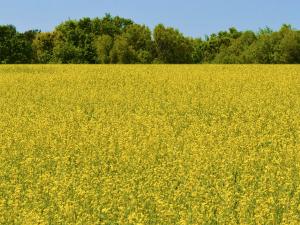
Field of carinata in full bloom in Seminole County, Georgia, courtesy of Ramdeo Seepaul, (North Florida Research & Education Center, University of Florida).
The research, led by UGA scientist Puneet Dwivedi, shows that this sustainable aviation fuel (SAF) could be a “game-changer” in replacing petroleum. "Carinata-based SAF could help reduce the carbon footprint of the aviation sector while creating economic opportunities and improving the flow of ecosystem services across the southern region,” says Dwivedi. The Southeast Partnership for Advanced Renewables from Carinata, or SPARC, is a $15 million Bioenergy Coordinated Agricultural project funded by USDA’s National Institute of Food and Agriculture. For more information read this UGA Today article.
Farm Bill Priority Areas
Plant health, production, and products
U.S. States and Territories
Georgia

